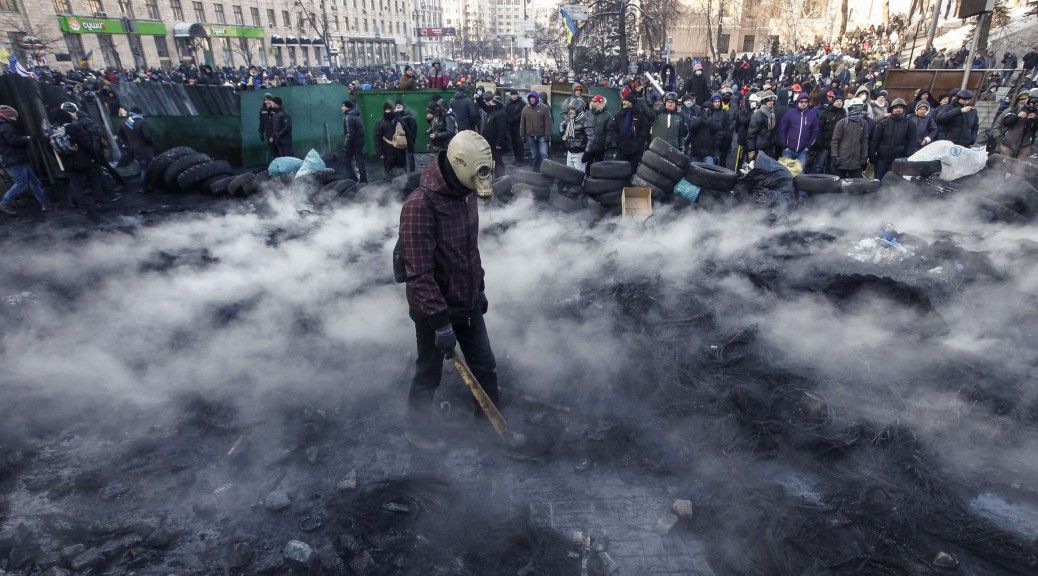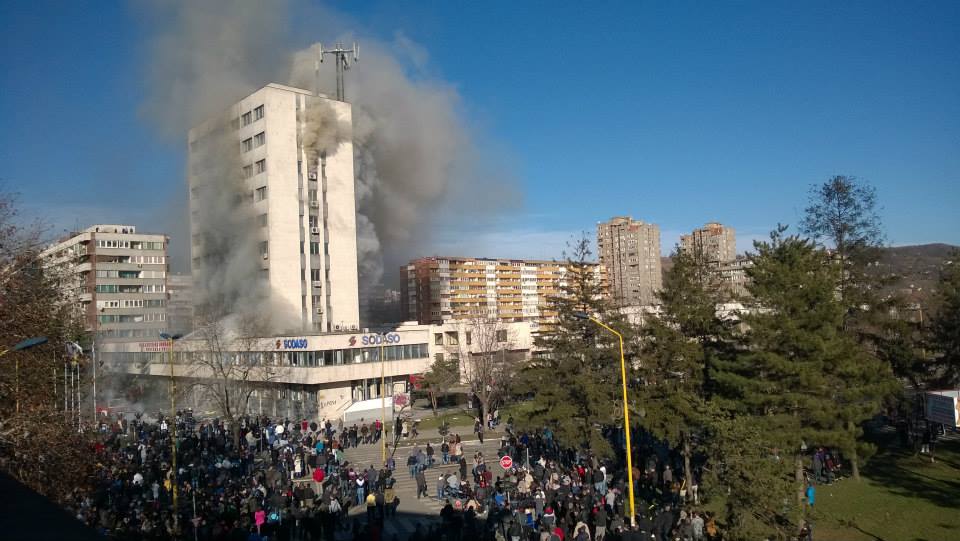There are sincere revolutions (repost from 2014)
The popular stand “self-aware” and “truth loving” inhabitants of our little planet tend to take towards smaller and bigger revolutions these days seems to be utterly cynical view how no act will change a thing. Even more – every revolution has to have somehow foreign backing factor they claim.

The following post was initially published on my old blog in February 2014.
Tankies, et. al.
The position of the cynic is that he alone holds some piece of terrible, unvarnished wisdom. The paradigmatic cynic tells you privately, in a confidential low-key voice: “But don’t you get it that it is all really about (money/power/sex), that all high principles and values are just empty phrases which count for nothing?” What the cynics don’t see is their own naivety, the naivety of their cynical wisdom that ignores the power of illusions.
~ Slavoj Žižek, “Why cynics are wrong?”

The popular stand “self-aware” and “truth loving” inhabitants of our little planet tend to take towards smaller and bigger revolutions these days seems to be utterly cynical view how no act will change a thing.
Even more – every revolution has to have somehow foreign backing factor they claim. So, for example, in case of “Occupy” movements and student protests in Europe at the beginning of this decade, there were some "unidentified" socialists and left wingers backing the protesters and giving them money and logistics. In case of Ukraine, they claim it’s all just EU/US propaganda and how foreign powers armed the protesters for their own agenda. In case of the riots in Bosnia and Herzegovina, Serbian and Croatian media quickly assembled the theory how riots are expression of Bosniac unitarist tendencies.
Every riot or revolution will have opposition which will not seek for the roots of the unrest in the proclaimed causes of revolution, but will try to make up its own causes for the turnoil. And usually, the blame will fall on either internal, but usually some foreign enemy will be blamed.
The reason is obvious. Revolutions rarely start when everyone is pushed to it. They start when there is a critical mass of people feeling cornered by their ruling class. The other part of the public has buy on the revolutionary claims.
So, yes, it is true while many people protested in Bosnian cities of Tuzla, Sarajevo and Mostar or Ukrainian Kyiv in the previous weeks, that many other people lived on their civilian lives, leaving the flags on the barricades to somebody else.
It doesn’t mean neither that “Bosnian riots” or “Ukrainian revolution” are not honest hope-for-the-best movements.
Different goals and the inevitable fragmentation of revolutionary groups
Following the example of Saturn, the revolution devours its children.
~ Jacques Mallet du Pan
Cynics always have a moment of their own triumph when revolutionaries part their ways and start internal fighting for power. Even better when it happens before the revolutionary triumph. It’s an almost inevitable outcome – solely being against something is in no way a guarantee that one’s own wishes and goals collide with somebody else’s just because both are against something or someone.
Bosnian riots almost fell as a victim to such concept. Croatian and Serbian media tried to feed that effect, but it succeeded only half way through in the end.
What was supposed to be “Bosnian revolution” wore off quickly in areas with absolute majority of any ethnic-religious group. Nationalists rethoric came into full power to convince people that riots are the way for “those others” to destabilize “achievements” of the recent war and how their national identity is under attack.
In the few cities which kept their mixed ethnic-religious groups despite the war, though, (meaning Tuzla, Sarajevo and divided but still the city where people are living near enough to each other – Mostar) citizens didn’t get distracted. They have organized into the citizen plenums and put their requests towards the local levels of the governments. And in those cities first results are already visible, but that’s the subject for whole another blog post.
Following the moderate success of turnoils in ethnically and religiously mixed cities, Bosnian riots have the opportunity to turn into the true, strong and honest reformative force for the post-conflict Bosnia and Herzegovina. Only problem is that some populist politicians smelled where the wind blows and are trying to profit from the movement despite not being involved in it, and despite being some of the biggest war profiteers in the country. But again, that’s whole another story.
Ukrainian example is similar in a way. Cynics will also tell you that in Ukraine nothing can change – how every actor in the country’s political spectrum is bound to corruptive behaviour and how Ukrainian revolution is just internal fight for power. Or even worse, how the whole thing is just a proxy war between Russia and western powers.
Cynics, obviously, have tremendously hard time to believe that people can sometimes, if even for the shortest of the moments in life, be in control of their future.
Nothing ever changes through the revolution
Old Benjamin, the donkey, seemed quite unchanged since the Rebellion. He did his work in the same slow obstinate way as he had done it in Jones’s time, never shirking and never volunteering for extra work either. About the Rebellion and its results he would express no opinion. When asked whether he was not happier now that Jones was gone, he would say only “Donkeys live a long time. None of you has ever seen a dead donkey,” and the others had to be content with this cryptic answer.
~ George Orwell “Animal Farm”

But it’s just the opposite. Even if the most corrupt of the rest of the politicians in Bosnia and Ukraine come to power on the wings of the revolution, the move has been made.
Similarly like European revolutions in the early modern historical era brought down some kingdoms, other also took a lesson from those events. None of the surviving kingdoms in Europe are royal totalitarian despotisms but they tend to be some of the most democratic places in the world with the highest living standard. Those which failed are, in the end, more or less democratic parliamentary environments which guarantee their citizens, if not all then most of the high democratic standards of our age.
Same way neither Bosnia nor Ukraine will ever be the same, no matter of the final outcome of their own bigger or smaller revolutions. And for all it’s worth it is hard to imagine societies there which would be less functional than the current ones in terms of democratic standards and the everlasting fight against the government corruption.
Overly agressive use of the force by the government
Look at arson – I mean, how many of us can honestly say that at one time or another he hasn’t set fire to some great public building. I know I have.
~ from the “Monty Python’s Flying Circus”, episode “Sex & Violence”
Primary difference between the riots which end up peacefully and those ending up in a small range civil war seems to lay in the reaction of the government.
While you feel like you can almost safely assume that violent crackdown on protesters is an approach of only non-democratic despotic governments (from the previous decades: Kosovo since the 1980s, Tiananmen Square, Lybia, Syria, recently Ukraine and Bosnia and Herzegovina), it is really a fallacy. I am old enough to remember Los Angeles riots from the 1992.., for example.
So, without pointing to anyone specifically, main thing which pushes the rioters into the more violent protests is actually not the too weak reaction by the government, but just the contrary.
It’s obvious that when tensions are high a forceful government crackdown on protests will almost certainly produce further violence. If you are a government figure anywhere in the world, your people are rioting right now and you are reading this by any chance, please understand that people protest because they feel threatened by you. It doesn’t matter if the threat they feel is real or it’s been produced by somebody else (best of the chance is that it’s real, trust me, you are the government), the subjective feeling is there. Pushing against it with violence will just open the gates of hell and everything will slip out of control.
There is basically no social turnoil which can’t be toned down by the democratic processes. And that could be, to be honest, misused by our governments, but I still feel I would feel better by being fooled over the negotiating table then by the bullet in my head. And I am deeply convinced huge majority of protesters behind any barricades feel the same. At least repression pushes them to the point where the choice doesn’t really matter any more.
Honest or dishonest – revolutions are here to stay
You will not be able to stay home, brother.
You will not be able to plug in, turn on and cop out.
You will not be able to lose yourself on skag and skip,
Skip out for beer during commercials,
Because the revolution will not be televised.
~ Gil Scott-Heron “Revolution will not be televised”
Revolutions are nothing new. Whenever critical mass of the people in some society felt like their government is holding them back or taking them too much while giving nothing in return, they started the revolution.
And even is somebody else sparked or simply supports the revolution you ended up with, the key fact to acknowledge is that no group of people is starting a revolution simply because they are bored to death.
And revolution is a messy thing. It takes its toll in lives, it always brings a lot of really bad side effects. But it started for a reason, one way or another.
So, instead of making up theories of who and why started some revolution, let us put an energy into making a better societies overall. Let us support or not support the revolutionaries and their goals, but let us not make excuses for not thinking about the causes of revolution when it sparks.
Let us not be Orwell’s donkeys of our time.
